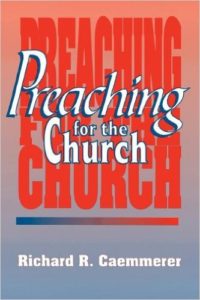The Lord be with you
 For many of us pastors our first “contact” with Richard Caemmerer was his book Preaching for the Church (published in 1959). In its pages we were introduced to “Goal, Malady and Means.” Through this book Caemmerer has influenced decades of LC-MS preachers and, therefore, decades of LC-MS Lutherans (like the ones who read this blog). Caemmerer certainly had a keen interest in preaching and his textbook, Preaching for the Church, is not the only place where he shared his thinking. Below is a quote from him taken from Lutheran Forum.
For many of us pastors our first “contact” with Richard Caemmerer was his book Preaching for the Church (published in 1959). In its pages we were introduced to “Goal, Malady and Means.” Through this book Caemmerer has influenced decades of LC-MS preachers and, therefore, decades of LC-MS Lutherans (like the ones who read this blog). Caemmerer certainly had a keen interest in preaching and his textbook, Preaching for the Church, is not the only place where he shared his thinking. Below is a quote from him taken from Lutheran Forum.
If the Gospel is to be preached for renewal it has to be the Gospel indeed, the proclamation that Jesus Christ died for the sins of the world and rose again. [Luke 24:46] Is this too simplistic a formula? Not at all, for this is the act of God by which he restores his life to the world. It is the program of God by which he brings about the rescue of mankind from the death of its separation from him. More, it is the resource for sustaining, and refreshing that restoration day-to-day and person-by-person.
How can a stream of words achieve such major results? True, our Lord likened it to seed, some of which falls on rock or is eaten by the birds. How in the world can old dogmas produce renewal? The answer is that it is not dogma, but preaching. It is the proclamation of a plan, the reach by which God himself thrusts into needy human hearts, and he does so through people.
Two components work together in this process: The witness who speaks it and is Exhibit A of the power of its message, andc the human heart and mind which opens to that message and has sensed the need for its healing. This is what the Gospels call metanoia, the reach and turning of the mind. The piety of the Church has often limited this simply to the sensations of penitence and guilt, “being sorry for sin.” But that is only half of the story, for it means turning to the forgiveness of sins. Preaching is holding that forgiveness up before the needy human heart and mind; it is the helping to take it because of the operation of God’s own Word of forgiveness and gift of his Son Jesus Christ.
In the tradition of Lutheran piety this has been called Law and Gospel. The term is appropriate, but its experience in the Church has been handicapped. Often the preaching of las and Gospel has been indoctrination, the informing of its teaching, the contrasting of its concepts, the review of its use in the history of the Church. But those terms are meant to denote God himself in action, rousing the human heart to awareness of its own death and weakness without him, and to acceptance of his gift of life through the blood of his Son. …
[The Lutheran Confessions, specifically Article VII of the Augsburg Confession] links the preaching of the Gospel with the administration of the Sacraments. Therewith it projects renewal into the practices of the worshiping community. The Sacrament of the Eucharist is an instructive parallel to what has to be going on in the preaching of the Gospel. Here members of the Christian community are in faith accepting the Body and Blood of Jesus Christ for the forgiveness of sins, and doing so in each other’s presence and as a demonstration of their accord in faith and love. And they are doing it with celebration and cheer. Notice these identical components at work in a genuine reception of the preaching of the Gospel. Here the Word of the atonement through the death and resurrection of Jesus Christ is being distributed for the acceptance and faith of God’s people for the forgiveness of their sins and the taking in of the grace and presence of God, and doing so in each other’s company and as a witness to their common faith.
True, preaching has not always worked in such a climate, but this only makes clear what makes for true renewal through the Gospel. The worshiping community buttressed Word and Sacraments with prayer and praise, hymnody and sharing, and thus helps the renewal to go on and to grow.
Richard R. Caemmerer, Sr. (1904-1984)
“Renewal in Evangelical Preaching” in Lutheran Forum, Vol. 17, No. 3
My source: For All the Saints, volume 2, year 1 (291-293)
Blessings in Christ,
Pastor Rickert
